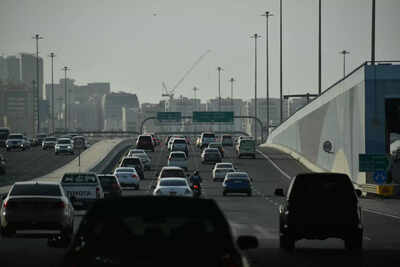
Abu Dhabi enforces new truck rules from December / Image source: File
The Integrated Transport Centre (ITC) in Abu Dhabi has rolled out essential restrictions on heavy vehicle movement, fundamentally changing logistics planning in the emirate.
This move is a strategic step to curb traffic congestion, enhance public safety, and protect vital road infrastructure. These regulations apply across major city roads and entry points, requiring all transport operators to strictly adhere to the revised schedules.
Abu Dhabi new peak-hour ban
To manage the significant volume of daily traffic, the ITC, under Abu Dhabi Mobility, enforces clear "no-entry" times for heavy vehicles. The updated rules primarily target freight trucks, large tankers, and construction equipment, aiming to separate slower-moving, heavier traffic from light vehicles during the busiest commuting periods.
This separation is crucial, as the interaction between vehicle types often leads to speed variation and accidents.
| Day | Restriction Period 1 (Morning Peak) | Restriction Period 2 (Evening Peak/Midday) |
| Monday to Thursday | 6:30 AM to 9:00 AM | 3:00 PM to 7:00 PM |
| Friday | 6:30 AM to 9:00 AM | 11:00 AM to 1:00 PM (Midday/Jumaa Prayer) |
Crucial Locations Affected:
- Abu Dhabi Island
- Major city arteries and urban zones
- Key entry points like Al Maqta Bridge and Mussafah Bridge
This timing is carefully calculated to reduce delays for commuters, allowing emergency and public transport vehicles to move efficiently during rush hours.
The December 1 rule
The original restriction linked to the beginning of December often refers to a temporary, extended ban implemented during national holidays or long weekends, such as the UAE Union Day celebrations.
Key Details of Temporary Bans:
- Purpose: To accommodate smooth traffic flow and major public events during extended national holidays.
- Vehicles Restricted: Typically includes trucks, lorries, and large buses used for transporting workers (50 or more passengers).
- Duration Example: A typical holiday ban might run from Friday (mid-day) through Monday (early morning). For instance, restrictions have been implemented from 12:00 PM on Friday, December 1, until 1:00 AM on Monday, December 4.
- Locations Affected: Entrances to Abu Dhabi Island, including Sheikh Zayed Bridge, Sheikh Khalifa Bridge, Mussafah Bridge, and Al Maqta Bridge.
Exemptions: In both permanent and temporary scenarios, crucial vehicles are usually excluded from the ban, specifically those needed for public sanitation services and vehicles carrying logistical support or essential utilities.
Enforcement and compliance
Adherence to these rules is mandatory and monitored by the Abu Dhabi Police using advanced systems. Violations are tracked digitally, and non-compliance results in significant penalties, including fines and potential vehicle impoundment for repeat offenders.To streamline and monitor commercial movement, the ITC introduced the "Asateel" platform.What Logistics Operators Need to Know:
- Mandatory Permits: Companies must obtain a freight transport permit from the ITC to operate legally in the Emirate.
- Digital Tracking: Vehicles must install electronic tracking devices linked to the "Asateel" system. This enables authorities to monitor vehicle location in real-time and ensure compliance with designated routes and restricted hours.
- Validity: Operator permits are valid for one year, and driver permits are valid for two years, requiring timely renewal.
The integration of smart systems ensures that these traffic regulations are not just policies on paper but are actively enforced in the digital and physical traffic landscape of the capital. The ITC and Abu Dhabi traffic authorities will enforce the restrictions; drivers found in breach may face regulatory action under traffic law. The ITC has released maps and alternative-route guidance to help compliance. For authoritative information, check ITC/WAM communications and the Abu Dhabi government channels.

 1 hour ago
1
1 hour ago
1










 English (US) ·
English (US) ·